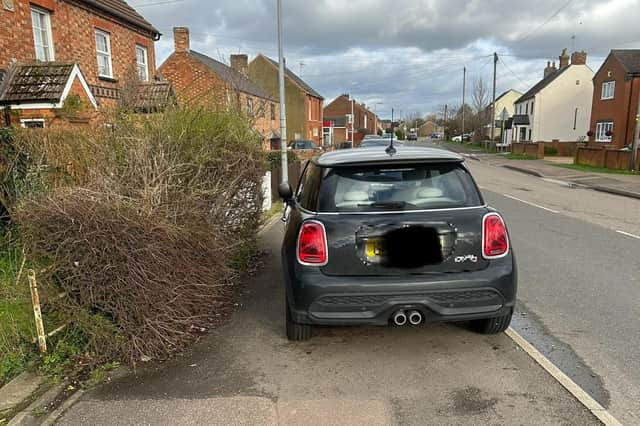Parking on pavements a 'real hazard' - but Bedfordshire drivers may escape fines


Parking on pavements across Bedfordshire creates a “real hazard” but drivers may be safe from being fined, an investigation has found.
The Local Government Association (LGA) said councils need more powers to enforce parking restrictions “to save lives and make our streets safer”.
Advertisement
Advertisement
But Bedfordshire’s three councils already have powers to do so.
The Local Democracy Reporting Service (LDRS) sent Freedom of Information Requests to Bedfordshire’s three councils to find the roads where parking on pavements was banned.
Central Bedfordshire Council (CBC) said it already has a “blanket prohibition” of pavement parking in place.
A CBC spokesperson said: “Parking vehicles on the pavement is not just inconvenient – it creates a real hazard for people walking and wheeling and puts people at a greater risk of collision and injury by forcing them into the road.
Advertisement
Advertisement
“Pavement parking is particularly challenging for many disabled people, especially people with mobility, neurological or visual impairments, as well as children walking and in buggies and we would ask residents to make better choices and to park with consideration and not on pavements.
“The council does have a blanket “no verge or footway parking” Traffic Regulation Order that covers Central Bedfordshire; however the necessary signage must be in place to enable enforcement of vehicles parking on the verges or footway under this contravention.”
The Local Democracy Reporting Service (LDRS) sent CBC a photograph of a car blocking a pavement in Cranfield – pictured above.
The CBC spokesperson said: “For the council to enforce a parking contravention a road must firstly be adopted and maintained by the council.
Advertisement
Advertisement
“Double yellow lines and single yellow lines (at the prescribed times) do cover the centre of the carriageway up to property boundary, so these do also cover verges and footways, however no obvious yellow lines can be seen in the image.”
The FOI request found that there are 15 roads in Central Bedfordshire that have “no footway parking” signage in place.
It also found that Bedford Borough Council (BBC) has prohibited pavement parking on 101 borough roads.
A Bedford borough spokesperson said: “The council is unable to take enforcement action against footway parking, where there are no parking restrictions in place.
Advertisement
Advertisement
“In such locations, the police have powers to deal with obstruction of the public highway and are able to enforce against any vehicle that obstructs a footway or driveway.
“We have installed ‘no footway parking’ restrictions across the borough, where there is local support.
“These restrictions are enforced by the parking services team who are available at all times of the day.
“We continue to install ‘no verge and footway parking’ restrictions, where there is support from the local ward member and Parish Council (if appropriate).
Advertisement
Advertisement
“Such restrictions will require additional signing to be installed to enable enforcement.”
A FOI to Luton Borough Council (LBC) found that it has 22 roads with the parking restriction in place.
A spokesperson for LBC said: "Where there are restrictions present (either by way of a footway parking ban or in the form of double or single yellow lines) residents are advised to contact the parking enforcement team and provide details of offending vehicle.
"Civil Enforcement Officers will then be prioritised to visit the location as soon as possible to investigate and where an offence has been found to be committed issue a penalty charge notice.
Advertisement
Advertisement
"Where there are no restrictions present, residents can request restrictions to be installed and the Council will investigate any requests and confirm what (if any) measures can be installed and the reasons why/why not they have been prioritised.
"The council is currently developing a Parking Strategy that will likely lead to the forming of a policy in relation to pavement parking in lieu of formal legislation or advice from Central Government.
"If there are no restrictions residents are advised that they can report footway parking that cause and obstruction (such as parking that means pedestrians have to enter the carriageway to pass the parked vehicle) to the police by dialling 101."
The LDRS approached Bedfordshire Police for comment on dealing with obstructions on the public highway.
Advertisement
Advertisement
Chief inspector Mike Chand, from Bedfordshire Police’s Local Policing team, said: “Enforcement of parking offences is in the first instance handled by the local authority.
“We would encourage motorists to park safely and considerately, bearing in mind dangerous obstructions to the road, other people’s property and pedestrian pavements. If a vehicle is reported to cause an obstruction which is considered to be hazardous to drivers or pedestrians, police have powers to intervene. The public can call 101 or use our online reporting service via www.beds.police.uk/ro/report.”